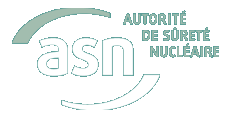| Chapter 06 |
- DEVELOPING RELATIONS BETWEEN ASN AND THE PUBLIC
- From public information to transparency
- ASN’s information media
- ASN’s website, www.asn.fr
- The French Nuclear Safety Authority’s Newsletter
- Contrôle magazine
- The ASN Report on the state of nuclear safety and radiation protection in France
- ASN in-house publications
- ASN’s audiences
- ASN and the general public
- ASN and professionals
- ASN and the media
- ASN and elected representatives
- ASN’s international communication actions
- ENHANCING THE RIGHT TO NUCLEAR SAFETY AND RADIATION
PROTECTION INFORMATION
- Information released by the licensees
- Information circulated on the initiative of the licensees
- Access to information in the possession of the licensees
- Public consultation about projects
- Public consultation procedures
- Developing public consultation
- The Local Information Committees and the National Association of Local
Information Commissions and Committees
- Local Information Committees for the Basic Nuclear Installations
- The Federation of Local Information Committees: the National Association of
Local Information Commissions and Committees
- High Committee for Transparency and Information on Nuclear Security
- Information released by the other stakeholders
- Institute for Radiation Protection and Nuclear Safety (IRSN)
Selection of websites of the various stakeholders
- OUTLOOK
|
|
Informing the public about nuclear safety and radiation protection
is one of ASN's fundamental roles. This role was conferred
on ASN from its inception, and was reinforced by the Act of
13th June 2006 relative to transparency and safety in the
nuclear field. The Act, which makes it a duty for ASN to inform
the public, defines transparency in the nuclear field as "all the
measures taken to guarantee the public's right to reliable and
understandable information concerning nuclear safety".
This duty to inform takes the form of numerous actions carried
out at international, national and regional level. These actions
are characterised by the multitude and diversity of the themes
developed, of the audiences targeted (general public, media,
institutional and professional audiences), and of the information
means used (press relations, events, publications, Internet,
etc.).
In 2012, ASN will continue to enhance transparency and information
on the subjects under its responsibility, together with
the other players and stakeholders.
It aims to make technical information more accessible and
comprehensible to the general public.
It will improve its publications in order to more closely match
the expectations of the audiences and will release more informative
and educational videos on its website.
ASN will also continue to consult the public by means of online
channels.
Developing exchanges with elected officials and stakeholders
will also be one of the focal points of its public information
actions.
In 2012, ASN will also continue actions to develop application
of the requirements of the TSN Act concerning licensee transparency
and procedures relating to nuclear activities.
It will contribute to the revision of the procedures for public
consultation - where nuclear activities are concerned - provided
for in the act on the national environment commitment
("Grenelle 2" Act): this chiefly concerns reforming the public
inquiries and the institutionalisation, further to an ASN proposal,
of a procedure for consulting the public about projects
that could lead to a significant increase in water intake or discharges
into the environment from a BNI, but which does not
fall under the public inquiry procedure.
ASN will continue to ensure correct application of the provisions
concerning access to the information in the possession of
the BNI licensees, and the recent extension of these provisions
to cover those in charge of the main radioactive material transport
operations. It will initiate consultation with a view to
applying these arrangements, as stipulated by the Act, to other
nuclear activity categories with an impact on the public and the
environment.
Finally, ASN will continue to support CLI activities. With
ANCCLI and in agreement with the licensees, it will establish
rules of good practice to make it easier for the CLIs to perform
their duties. It will reiterate its proposals to the Government
with a view to ensuring that the CLIs are given the resources
they need..
|




